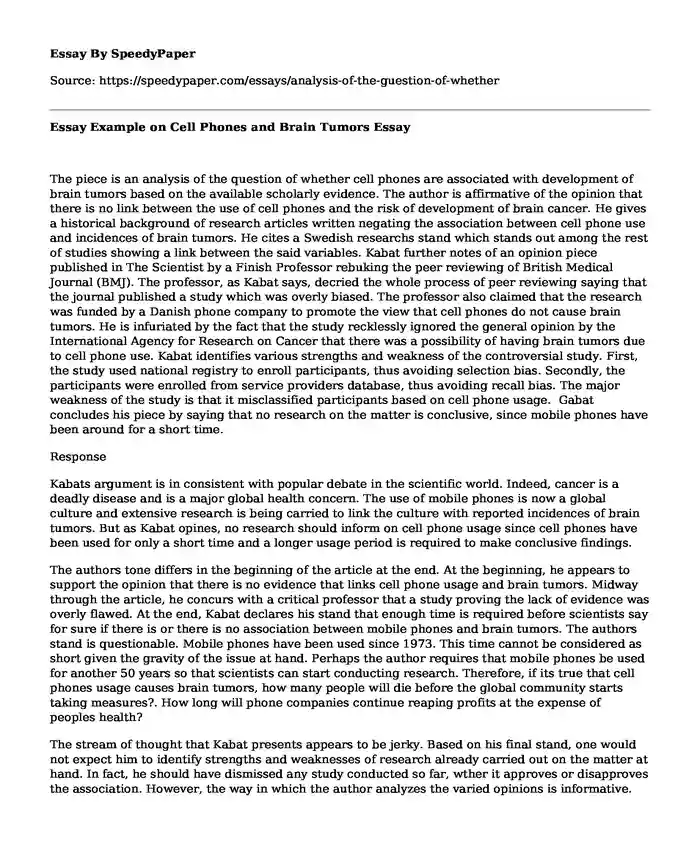
| Type of paper: | Essay |
| Categories: | Medicine Information technologies Cancer |
| Pages: | 3 |
| Wordcount: | 759 words |
The piece is an analysis of the question of whether cell phones are associated with development of brain tumors based on the available scholarly evidence. The author is affirmative of the opinion that there is no link between the use of cell phones and the risk of development of brain cancer. He gives a historical background of research articles written negating the association between cell phone use and incidences of brain tumors. He cites a Swedish researchs stand which stands out among the rest of studies showing a link between the said variables. Kabat further notes of an opinion piece published in The Scientist by a Finish Professor rebuking the peer reviewing of British Medical Journal (BMJ). The professor, as Kabat says, decried the whole process of peer reviewing saying that the journal published a study which was overly biased. The professor also claimed that the research was funded by a Danish phone company to promote the view that cell phones do not cause brain tumors. He is infuriated by the fact that the study recklessly ignored the general opinion by the International Agency for Research on Cancer that there was a possibility of having brain tumors due to cell phone use. Kabat identifies various strengths and weakness of the controversial study. First, the study used national registry to enroll participants, thus avoiding selection bias. Secondly, the participants were enrolled from service providers database, thus avoiding recall bias. The major weakness of the study is that it misclassified participants based on cell phone usage. Gabat concludes his piece by saying that no research on the matter is conclusive, since mobile phones have been around for a short time.
Response
Kabats argument is in consistent with popular debate in the scientific world. Indeed, cancer is a deadly disease and is a major global health concern. The use of mobile phones is now a global culture and extensive research is being carried to link the culture with reported incidences of brain tumors. But as Kabat opines, no research should inform on cell phone usage since cell phones have been used for only a short time and a longer usage period is required to make conclusive findings.
The authors tone differs in the beginning of the article at the end. At the beginning, he appears to support the opinion that there is no evidence that links cell phone usage and brain tumors. Midway through the article, he concurs with a critical professor that a study proving the lack of evidence was overly flawed. At the end, Kabat declares his stand that enough time is required before scientists say for sure if there is or there is no association between mobile phones and brain tumors. The authors stand is questionable. Mobile phones have been used since 1973. This time cannot be considered as short given the gravity of the issue at hand. Perhaps the author requires that mobile phones be used for another 50 years so that scientists can start conducting research. Therefore, if its true that cell phones usage causes brain tumors, how many people will die before the global community starts taking measures?. How long will phone companies continue reaping profits at the expense of peoples health?
The stream of thought that Kabat presents appears to be jerky. Based on his final stand, one would not expect him to identify strengths and weaknesses of research already carried out on the matter at hand. In fact, he should have dismissed any study conducted so far, wther it approves or disapproves the association. However, the way in which the author analyzes the varied opinions is informative. For example, he does not side with BMJ or Professor Dariusz Leszczynski on the matter of a controversial study. He takes the reader through a scientifically acceptable method of evaluation of a study. He weighs the strengths of the study against its flaws and lets the reader be the judge. From this observation, Kabat appears informed, unbiased and critical.
There are some words and phrases that Kabat uses to stress his opinion on certain matters. He says that the professors ability to resist the evidence was stunning. Generally, this article would get approval of an optimistic audience that wishes that scientists find no relationship between cell phone usage and brain tumors. At the same time, a scientifically exposed audience would find the subject matter favorite for discussion. Throughout the article, Kabat proves to be open to varied opinions and that is why he weighs all presented opinions against both science and reason to finally make his argument.
Cite this page
Essay Example on Cell Phones and Brain Tumors. (2019, Sep 25). Retrieved from https://speedypaper.com/essays/analysis-of-the-guestion-of-whether
Request Removal
If you are the original author of this essay and no longer wish to have it published on the SpeedyPaper website, please click below to request its removal:
- Essay Sample on How Hyper Parenting Impacts a Child's Development
- Free Essay Sample about Traveling
- Free Essay Sample on NAHQ Code of Ethics
- Essay Example on Development Federalism
- Teaching Essay Sample: Reading Mini-Lessons
- Free Essay: Gossip, Conversation, and Eavesdropping in Shakespeare's "Much Ado About Nothing"
- Free Essay Example on Cotton History
Popular categories




